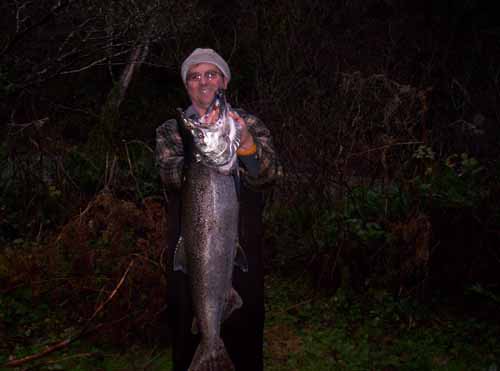Search
Latest Articles
Hook More Fish
by Scott T. Starbuck , July 31, 2016
Use a New-ish File and Sharp Hook
Worn or rusty files work, but not as well, and they take away valuable fishing time. A new file can turn a hook from dull to razor in a few strokes.
A related issue happens when an angler snags, even temporarily, and fails to check the hook point. With a magnifying glass or the side of your thumb, you can tell if the tip is no longer straight. If the flesh on your thumb isn’t pierced without effort, it’s too dull. Needle nose pliers can straighten the tip, and the new file can deliver razor stickiness. If an over-filed hook lacks potential for razor stickiness, replace it.
Scents
Sometimes a dab of shrimp or anise scent on a fading egg cluster, or herring oil on a spinner, entices a strike on an otherwise slow day.
Timing
In low water years especially, timing can be vital. I mean both time of day (sunrise and sunset), and timing the peak of the fish run. Check local fishing regulations to make sure you don’t cast until the minute it is legal.
Match the Hatch
It’s painful to watch a fly angler casting a giant tutti-frutti feathered beast alerting every fish within sight distance all is not well in the underwater world. The obvious solution is to turn over a few stones in the shallows to see the size and shape of insects, crawfish, or whatever. Some serious anglers bring vice and fly-tying gear to river to match the hatch, but I bring assorted and organized fly boxes of 300 or 400 flies so I can usually get close.
Once you keep a fish, examine the contents of its stomach to see preferred items on the menu that morning. I did this yesterday on a remote trout stream, and immediately caught seven fat wild redsides in what had been slow fishing.
Mental State
Balanced and focused are the two words in this area. Anglers seething with anger, which is not as uncommon as one may think (they can always find an excuse to seethe), or distracted by cell phone or social media addictions, may miss important clues such as tiny remains of freshly cleaned fish, identifying a good spot, or small caddis revealing a needed change of color and size of fly.
Lacking Essentials
Lacking an essential item or items can prevent fishing, cut into fish time, or cause a range of problems and inconveniences. Here is a standard list of items to consider:
Bug spray; bear spray (in areas with bears); snake bite kit (as a trip to the hospital can really cut into fishing time); first aid kit, whistle, candle, and fire starting items; glow in the dark watch; glow in the dark Corkies for the first hour of daylight; compass and map; flashlight, headlamp, and extra batteries; two needle nose pliers (in case one is lost or “borrowed”); four finger nail clippers (most commonly lost item due to frequent use); fishing license, water and tp; rain gear, sun hat, wool hat, wool gloves, and clothing matching colors of environment; extra pair of dry socks; pen for recording catches on salmon / steelhead tag and recording ideas / places from other anglers; cell phone in case fishing is good and you have to cancel work, or a wedding, or something; secret fishing lure; high powered glasses for distance fishing, locator glasses which also serve as sunglasses, extra eye glasses; reel oil, reel repair kit, and spare reel and line for conditions; extra fishing gear for various conditions; credit card, driver’s license, and passport; food, medications, and chocolate bars to entice those in your fishing party to stay longer; tooth numbing agent and eyepatches for wayward pencil leads (you think I’m joking); spare laces for wading boots; knife and antibacterial soap for knife; stringer for keeping fish cold in the water after you bleed them; shoulder bag and laundry bag liner for carrying out fish; camera or camera phone for fish, ziplock quart size bags for salmon or steelhead eggs (don’t let water touch them!) and to pick up fishing trash left by other anglers; and most importantly, a healthy sense of humor for when you, and others, forget things.

Local Knowledge
When it comes to fishing, nothing stinks like the human ego. A little modesty goes a long way in finding out from other anglers what works in a specific area, and why.
Frequent area angler Scott T. Starbuck has a new book of fishing poems, Lost Salmon, by MoonPathPress.com (and available at Amazon.com) in August 2016. He is grateful for praise from noted fishers Frank Amato, Jon Broderick, Henry Hughes, Marty Sherman, David Joy, Jack Driscoll, and Larry Gavin. Starbuck’s blog Trees, Fish, and Dreams, with his recent catches, is at riverseek.blogspot.com
